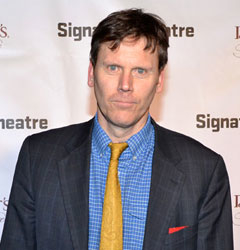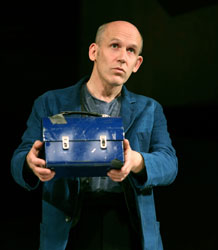Will Eno: 'Edinburgh is like a riot, with velvet ropes'
Eno’s monologue ”Title and Deed” at Assembly Hall has received rave reviews and recently won a Stage Acting Award for Conor Lovett

© David Gordon
What prompted you to write Title and Deed?
I was prompted to write Title and Deed by feelings I have always felt, and that I assume most people feel, and the desire to organize them into a form that might encourage and allow people to feel the big and strange things in a small but deep way. I have, at times, felt not quite "at home," on Earth, as I'm sure most people have, and, like everyone else, I have tried to make the best of it, and have certainly needed help in order to feel and see just where it is that I am and where I've come from, in order to move forward, and the play is mainly an effort in that direction. Judy and Conor [Lovett] and I have been talking for ten years or more about working together on something and we are all very happy to have arrived at this.
Could you give us an overview of the play?
In the same way that you could give a person an overview of the sunset, last night, you can give them an overview of a play, and both contain a general sense of the facts of the experience, but the great thing about a play, and a sunset, is: you kind of have to be there. But the general facts are these: the play is a monologue in which a man arrives, in the theatre and in the country and, as if you were both waiting in line for a taxi or waiting for a store to open, he begins to speak of his travels, both from the womb to the larger world, and from his homeland to yours. And this develops, with a good rhythm, a few big (I hope) laughs and some very subtle violence, towards what I hope is both a cathartic and melancholy end, as well as an invigorating and enlivened beginning. That is to say, I hope an audience member will find beauty and meaning and laughs in the play, while the play is going on, and then, in the world outside, when he or she leaves the theatre. The play and the production are, I hope, funny and sad and strange in roughly the same ratios as life as we tend to know it.
It's been described as a 'perfect marriage of actor and material' – do you agree?
Conor Lovett is a great, great interpreter of the play and has exactly the right mix of intense emotional specificity and wide-ranging intellectual curiosity and such an easy way with the language. Judy [director, and Conor's wife] does such great work in keeping it both completely human and also a little supernatural.

© Joan Marcus
How different is working in monologue to dialogue?
In some ways, if you take the communal audience mind to be the other person, the two modes can be similar.
How big an influence is Beckett on your work, and how does it feel to be compared to him?
I am a big admirer and fan of Beckett, but I really try to be on watch that I am both being myself and at least trying to add something new to the mix. My father died, last week, the night before my daughter was born, and though this could probably be described as a Beckettian event, I'm sure neither one of them was thinking much about that. I am sure that moment in both of their lives felt entirely original to them. So, there are some themes, such as death, that Beckett has put a pretty strong stamp on, but they belong to all of us. We all get to die, thank you very much.
As for the mechanics of the play, the form of direct conversational address employed in Title and Deed is a pretty plain departure from Beckett's dramatic work, in which he tended to hold the audience at a couple arms' lengths and often in a hilariously hostile regard. But again, he is almost extra-terrestrially strong as a writer, and he seemed like a very good man, too, so it makes me feel really good that people would even mention my name in the same sentence as his.
What are your experiences of the Fringe?
The Edinburgh Fringe is such a great and historic and wild event. It's like a riot, with velvet ropes. I am really grateful to Jim Houghton and the Signature Theatre in New York, and Conor and Judy and Gare St. Lazare, and Assembly, for making it all happen. I wish I could be there, but our daughter is seven days old today and needs us to hold her head up, among many other very happy and beautiful obligations.
I loved it so much when I was there in 2003. I loved walking up to Arthur's Seat and looking at the city. I also always loved bagpipe music and it was a real thrill to see the Tattoo. This is silly, but I remember when we were there, we had a joke about eating at McDonald's, that it was bad luck to say the name inside the place, so you had to refer to it as "the Scottish Restaurant." Edinburgh in August is like walking around inside a crazy but lovable person's head.
What's next for the production, and for you?
We're talking about places in London where the production might fit well and might be able to happen, and also, Gare St. Lazare has a very well established touring circuit, and I hope the production will continue making its way into and around the world. As for my own plans, I'll be making sure my little family is hydrated and I am working on a new play.
Title and Deed runs at Assembly Hall until 25 August
FOR MORE ON EDINBURGH 2014 VISIT WHATSONSTAGE.COM/EDINBURGH-FESTIVAL












